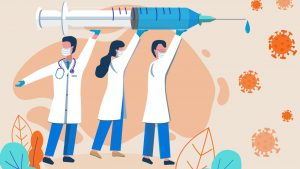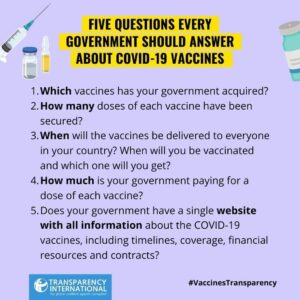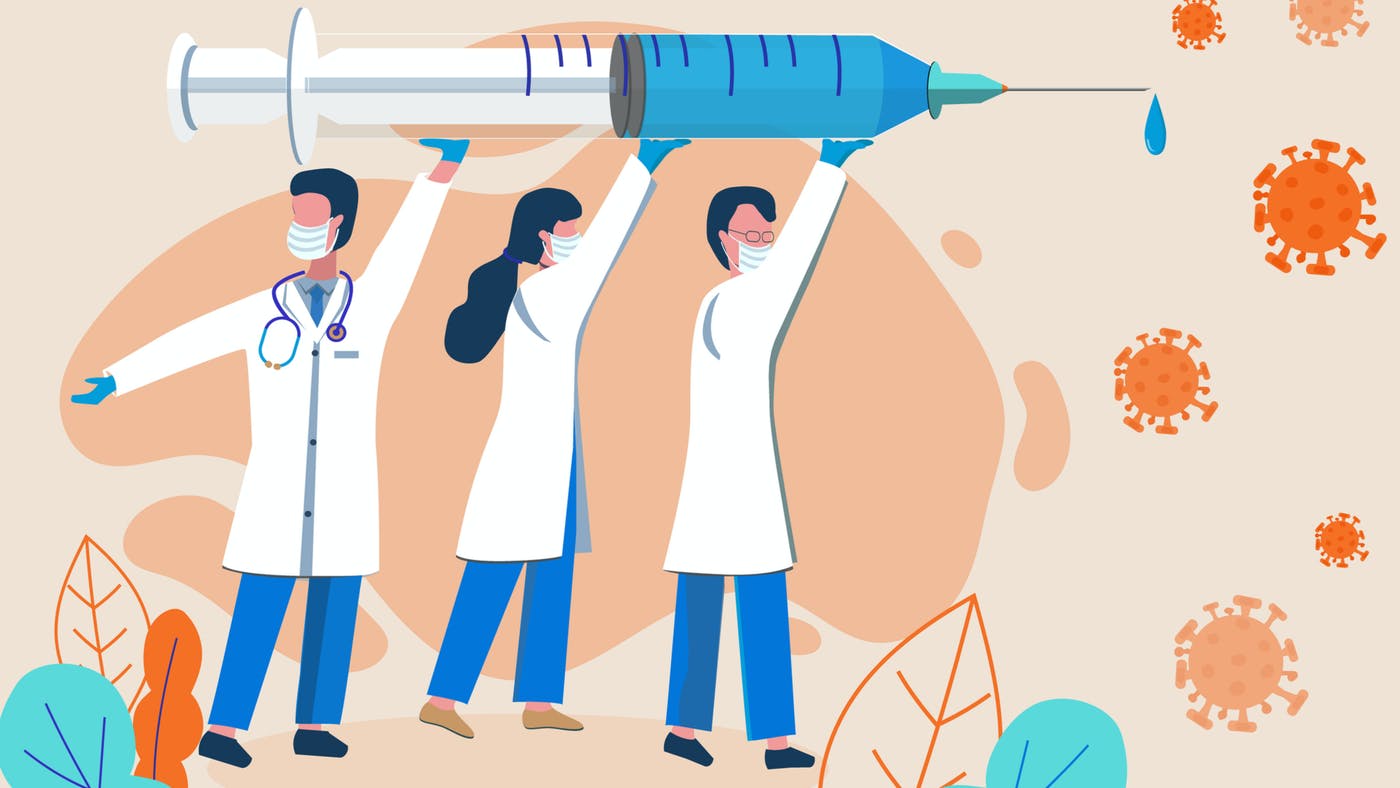Transparency International calls for fair, transparent and equitable access to COVID-19 vaccines and treatments

Across the globe, countries are under extreme pressure to secure COVID-19 vaccines for their citizens.
Yet, corruption poses serious risks to vaccine delivery, as a lack of transparency over the development, procurement, allocation, and distribution of COVID-19 vaccines threatens a fair and equitable global response.
One of the biggest challenges to a global COVID-19 recovery is transparency and equitable access to COVID-19 treatments and vaccines.
Overcoming the wealth gap
To date, high-income countries have purchased most COVID-19 vaccines (56 per cent), while low-income countries have been largely left behind.
With limited supply and high demand, wealthier countries are paying more to guarantee access to COVID-19 vaccines for their citizens, at the expense of developing countries with fewer resources.
By contrast, only 14 per cent of the world’s COVID-19 vaccines have been purchased by COVAX, a global initiative to provide fair equitable access to COVID-19 tests, treatments, and vaccines.
COVAX harnesses collective buying power to purchase vaccines and distribute them to developing countries that can’t compete with wealthy countries in securing private contracts.
Countries compete for vaccine supply
Pitting countries in direct competition with each other is not the way out of this pandemic. Ending the pandemic will take nothing less than a collective global effort, because the virus doesn’t recognize borders.
Vaccines should be distributed on principles of equity, with frontline health workers receiving their doses first, followed by those most vulnerable by age or health.
In practice, however, the reality is more of a free-for-all, where the wealthy and powerful use their influence to ensure access, while low-income families steadily lose trust in the systems and governments that are supposed to protect them.
COVID-19 vaccine delivery is ripe for corruption
Corruption poses enormous risks to vaccine delivery, as a lack of transparency over the development, procurement, allocation, and distribution of COVID-19 vaccines threatens a fair and equitable response.
Given their great demand, COVID-19 vaccines have an extremely high street value, which makes them particularly vulnerable to corruption.
Corruption risks vary from a lack of transparency over the prices paid for COVID-19 vaccines by governments and the confidentiality of those contracts with drug companies to broader issues of access that affect who gets vaccinated and when.
Corrupt contracts
Corruption during COVID-19 has already been reported in a host of countries, many of which have neither equitable nor transparent vaccine distribution plans.
As countries develop contracts with pharmaceutical companies to procure vaccines, corruption in public procurements remains high.
Research shows governments spend about 30 per cent of their budgets on public procurement, yet in the health sector, approximately 7 per cent are lost to corruption and inefficiency.
Contracts and pricing agreements between governments and drug companies often remain confidential, despite being paid for by public funds from taxpayer money.
Confidentiality clauses
People have the right to know information about the vaccines they receive, including who is liable if something goes wrong.
While indemnity agreements protect vaccine companies against lawsuits in some countries, since these agreements are often confidential, it is difficult to know who, what, where and when responsibility rests for potential fall-out.
While Freedom of Information Act (FOIA) requests for more information on COVID-19 contracts have been submitted by citizens and civil society groups in some countries, many requests have been denied.
Access to information can help prevent corruption
Access to information is a human right, particularly when it concerns our health. Without critical information about the nature and costs of COVID-19 vaccine contracts, accountability is impossible.
Access to information can help prevent corruption, including the abuse of public resources, conflicts of interest, petty corruption, etc. It also helps manage expectations, create trust in government, and uncover misinformation.
While confidentiality is necessary to protect proprietary information of vaccine formulas and other patent considerations, confidentiality clauses should not be used in relation to cost, which is paid with public resources, nor with regards to the quantity of vaccines purchased, contractual conditions, nor the distribution timeline.
Other corruption and transparency risks
A lack of transparency during research and development of vaccines can lead to citizens losing trust in the distribution process while misinformation campaigns that disregard science and data can also sow public distrust.
Countries also lack sufficient data for COVID-19 vaccine allocation to ensure an effective, targeted roll-out.
Significant gaps in data exist about who is eligible for a vaccine, where they live, what health conditions they may have that could priorities their place in line, etc. This makes the vaccine allocation process ripe for political and social bias that could cost lives.
Corruption across COVID-19 vaccine distribution is another important risk. Stronger distribution is needed to ensure vaccines are not stolen or diverted and to protect against fake or faulty vaccines from entering the market, including from sources like organized crime.
Given the lucrative market for COVID-19 treatments and vaccines, bribery is a huge challenge, particularly in the places where people access health care.
Looking ahead
We have a long way to go to achieve widespread COVID-19 vaccine coverage, with most countries, particularly those in Africa, Asia and Latin America, not receiving full coverage until as late as 2023.
Unfortunately, the longer it takes for people to access vaccines across the globe, the more opportunities there are for the virus to mutate or change, which will have enormous health and economic consequences worldwide.
We can save millions of lives and trillions of dollars by working together to distribute COVID-19 treatments and vaccines in a fair, equitable, and transparent way.
What citizens can do
Corruption will only stop when people work together to change the system. Reporting corruption and holding governments accountable for their actions are some of the most effective ways to affect change and assert citizens’ rights.





